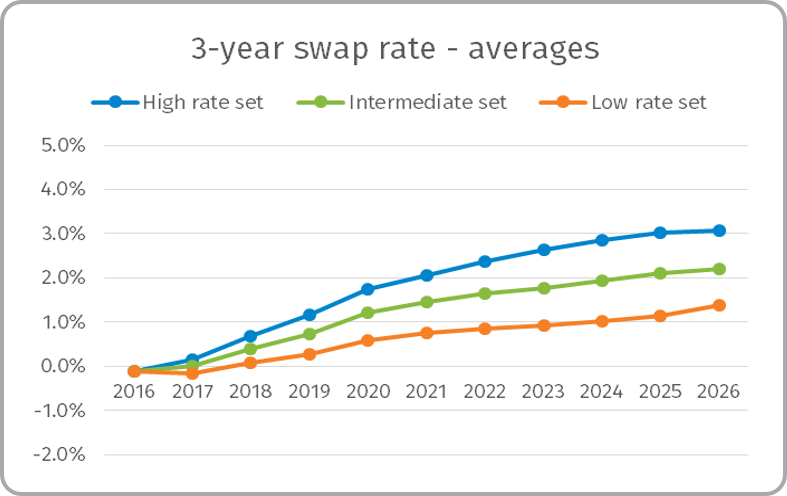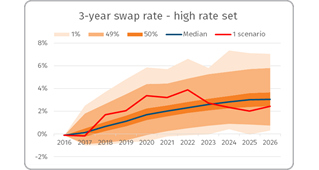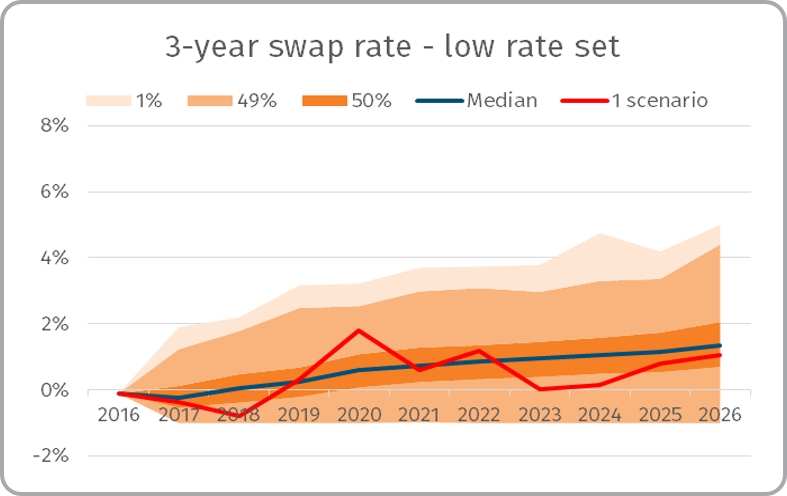We live in an uncertain economic world. Interest rates have been very low in recent years, amongst others due to quantitative easing programs. But what will happen with interest rates and the return on investments when these quantitative easing programs come to an end? Next to that, demographics (ageing societies, migration within and across borders) can also have a large but uncertain impact on the economy, and thus on investment returns for institutional investors. As an institutional investor, you are aware of that. But how do you include this uncertainty in your decision making, both at the strategic level (a.o. in setting your Strategic Asset Allocation, SAA) and at the more tactical and operational level when monitoring risks on shorter horizons?
Ortec Finance helps with GLASS software and OFS
At Ortec Finance we help institutional investors coping with this uncertain economic and financial world with our GLASS software and our ‘Ortec Finance Scenario set’ (OFS). By using GLASS and the OFS, you can analyze the financial soundness of your organization under a large range of economic and financial circumstances.
Our clients use our GLASS software and the OFS for all types of risk management applications such as Asset Liability Management (ALM), Own Risk and Solvency Assessment (ORSA) and risk monitoring. The OFS bundles the results from continuous innovations based on 30 years of experience, and offers the most realistic reflection that Ortec Finance can produce of how economies and financial markets might (rather than will) evolve in the future. In all these applications, the resulting expected return is driven by the (same) average scenario path within the scenario set used. And the same also partly holds for downside risk measures like VaR and CVaR. So if, for instance, the average scenario path shows a slow increase of interest rates, this will impact the expected return, which is measured as the average return across all scenarios.
Some of our clients develop their own stochastic or deterministic world views or stress tests next to the OFS to test the sensitivity of the results for changes in the average scenario path. Examples are “low for long”, deflation, stagflation, or a world with strongly increasing interest rates. Constructing such alternative world views is challenging and time consuming. It is challenging because it is difficult to construct a complete and consistent global world view, as most of the time, you start off with only an alternative view on a limited number of variables. For instance, the view that European interest rates will remain low for the decade to come. But how to consistently translate the impact of these low European interest rates on all other global economic and financial variables?
The advantage of using filters
As an alternative to constructing your own alternative world views or stress tests, our GLASS software offers you the possibility to filter all OFS scenarios based on desired characteristics. For instance, you can filter your scenario set for scenarios where the 10-year swap rate remains below 1% for the coming 10 years. Or you can split your OFS scenario set into 3 subsets based on the average swap rate in the coming years. This gives you three equally sized scenario sets: a “low for long” set, a neutral set, and a set with strongly increasing swap rates. See Exhibit 1 for an example, where the 10-year average and 3-year swap rate is used to split the OFS into three equally sized subsets.
Exhibit 1



By construction, the impact of the filter applied is consistently translated to all other economic and financial variables. Just make sure that the number of scenarios in your filtered set is sufficiently large. So by adding filters to the OFS in this way, you can easily and quickly create a large number of internally consistent alternative world views or stress tests. And as the GLASS system also reports all relevant risk and return measures on these filtered sets, you can easily see how sensitive your organization is to alternative economic developments.
So, when you want to know how sensitive your organization is to changes in the economic assumptions, and you need the answer at short notice, just apply filters to the OFS in your GLASS system.
Like to know more?
If you have questions or remarks, feel free to contact your Ortec Finance account manager or Bert Kramer, Senior Consultant Pension & Insurance Risk Management.
Contact











